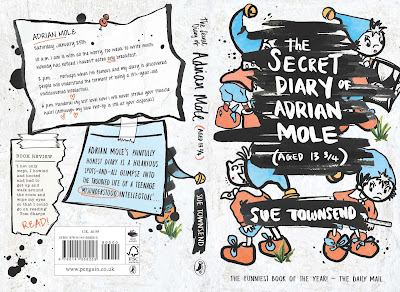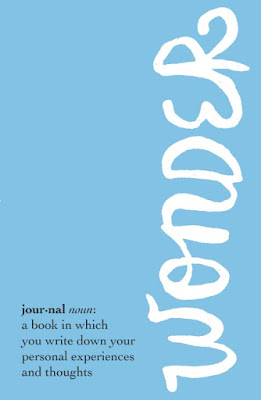Brief
Wonder by R.J. Palacio
My name is August.
I won’t describe what I look like.
Whatever you’re thinking, it’s probably worse.
Moving, uplifting and hopeful, Wonder was first published in 2012 to critical acclaim and quickly established itself as a must-read for children (and adults!)
With the nature of friendship, tenacity, fear and, most importantly, kindness at its heart Wonder explores fundamental truths about how people behave and how they should behave.
The design for the original front cover was from designer and illustrator Tad Carpenter.
The BriefWith the nature of friendship, tenacity, fear and, most importantly, kindness at its heart Wonder explores fundamental truths about how people behave and how they should behave.
You are invited to design a cover look for Wonder to bring this original and unforgettable book to new readers. The design should ensure that this important book remains a must-read for every child.
Your cover design needs to include all the cover copy supplied and be designed to the specified design template (B format, 198mm high x 129mm wide, spine width 19.5mm), incorporating the PUFFIN branding and all additional elements such as the barcode. Please refer to the Submissions Details page for full details of the spec and how to submit your entry.
Copyright must be cleared for all images used in your cover design and you must include a credit line on the back cover of your design for any third party images used. For example: ‘Cover photograph by Joe Bloggs’.
Copyright must be cleared for all images used in your cover design and you must include a credit line on the back cover of your design for any third party images used. For example: ‘Cover photograph by Joe Bloggs’.
What the judges are looking for
We are looking for a striking cover design that is well executed, has an imaginative concept and clearly places the book for its market. The cover should encourage children to pick the book up and buy it for themselves and should also engage adults to want to buy it for them.
While all elements of the cover (front, back and spine) need to work together, remember that the front cover has to be able to work on its own, and to be eye-catching within a crowded bookshop setting as well as on screen at a reduced size for digital retailers.
The winning design will need to:
- have an imaginative concept
- be an original interpretation of the brief
- be competently executed with strong use of typography
- appeal to the broadest possible audience for the book
- show a good understanding of the marketplace
- have a point of difference from other books that it will be competing against in the market
- be able to sit on the shelves of a supermarket or ebook store as easily as it sits on those of more traditional bookshops
The winning design will need to:
- have an imaginative concept
- be an original interpretation of the brief
- be competently executed with strong use of typography
- appeal to the broadest possible audience for the book
- show a good understanding of the marketplace
- have a point of difference from other books that it will be competing against in the market
- be able to sit on the shelves of a supermarket or ebook store as easily as it sits on those of more traditional bookshops
Research
Former children's book prize winners:From these examples I found that the judges of the competition favour illustration quite a bit. That is understandable as the designs are aimed at children, this is also one of the reasons I choose the children's book as my entry, because I like illustration myself and want to make it part of my practice. I also found that they like attention to detail, and very carefully considered and executed illustrations. This resonated with me, because I also like to make detailed illustrations, and believe I will be able to come up with a design that they like. The previous winners, I also noticed, although aimed at children, also had very clever concepts and quite professional/mature executions, so they would appeal to adults as well as children. This is something that I will need to keep in mind, and make sure that my concept and design is not too simplified, that it appeals to both children and adults/their parents.
'Wonder' by RJ Palacio:
'My name is August. I won't describe what I look like. Whatever you're thinking, it's probably worse.'
Auggie wants to be an ordinary ten-year-old. He does ordinary things - eating ice cream, playing on his Xbox. He feels ordinary - inside. But ordinary kids don't make other ordinary kids run away screaming in playgrounds. Ordinary kids aren't stared at wherever they go.
Born with a terrible facial abnormality, Auggie has been home-schooled by his parents his whole life. Now, for the first time, he's being sent to a real school - and he's dreading it. All he wants is to be accepted - but can he convince his new classmates that he's just like them, underneath it all?
WONDER is a funny, frank, astonishingly moving debut to read in one sitting, pass on to others, and remember long after the final page.
Plot:
August "Auggie" Pullman is a homeschooled fifth-grader living in North River Heights in Upper Manhattan with his parents. He has a medical condition, often equated with Treacher Collins syndrome, which has left his face disfigured. Due to his condition, August has been homeschooled by his mother; however, wanting him to experience a larger world, his parents enroll him into Beecher Middle School for the start of fifth grade. August has a sister, Olivia "Via" Pullman, who is older than he is and often puts her brother's needs before her own.
On his first day of school, August tries not to draw attention to himself. His efforts are in vain, and Julian, one of the students whom the principal has asked to help August at school, immediately bullies him for his appearance. August's hopes for the school year are later raised slightly when he forms friendships with classmates Jack and Summer, both of whom defend him from Julian's taunts.
The situation comes to a head on Halloween when August, disguised in a costume, overhears Jack joining in with the bullying. As August isolates himself from his classmates and family, his sister Olivia's frustration grows, fueled by years of feeling ignored by her family.
Returning to school, August ignores Jack but admits to Summer that he had overheard the incident. Jack feels ashamed for his actions, and punches Julian in the mouth and he gets suspended from school. Over the winter break, Jack reconciles with August.
As the school year progresses, the bullying August faces become more serious and extends to Jack as well. Julian manipulates several friends into turning against August and Jack. In addition, Julian's mother voices her concerns over August's attending the school, citing that his appearance may be too much of a burden for the other students to handle.
Olivia confides in her mother that she does not want August to attend her school play, as she had found comfort in the fact that nobody at her new school knew about her brother's condition. August overhears and storms out of the room.
When the main actress, Miranda, Via's (Olivia's) best friend, decides that Via should take the leading role of the school play, she told the director that she couldn't be in the school play, Olivia takes on the role. Her family celebrates by taking her and Miranda out for dinner.
At the end of the school year, the students are invited on a three-day school trip to a nature reserve. August is initially concerned about going. However, upon hearing that Julian will not be attending (due to being suspended for two weeks for his behavior), August decides to join his friends on the trip. He has fun until the last night, when he and Jack go to the woods and are attacked by seventh graders who start to beat them, only to be saved by Julian's friends. August lost his hearing aids and started hearing ocean sounds. One of the boys said "your hearing aids fell off." He got concerned because he could barely hear much anymore because the ocean sounds were taking over his ability to hear.
With the summer vacation fast approaching, August is informed that Julian will not be returning to Beecher Prep for the next grade. The Pullman family get a new puppy, whom they call 'Bear'. At the graduation ceremony, August is awarded the 'Henry Ward Beecher Medal' for being 'notable or exemplary in certain areas throughout the school year'. Incredibly proud of her son, August's mother comments that he is a 'wonder'.
Existing 'Wonder' designs (and associated designs):
Key Scenes that grabbed my attention from reading the book:
- August wears astronaut helmet to hide his face.
- He likes Star Wars, and wants to wear Boba Fett costume for Halloween.
- He wears the Scream costume for Halloween instead.
- He wears a mummy costume for a school fair/event.
- He wears suit and bow, and cuts his hair for Graduation.
- Augusts' family has a dog named 'Daisy'. Then, a puppy named 'Bear'.
- Each month, his English teacher assigns precepts.
- He wears hearing aids that stretch around his head.
- His sister gets a standing ovation after her play.
- August gets a standing ovation during his graduation.
- The kids who were mean to him end up protecting/defending him.
- His self-portrait as an animal is a duck. No metaphors.
- 'Sometimes a duck is just a duck.' - His principle.
Main Themes I believe the book presents:
- Friendship
- Kindness
- Family
- Coming of Age
- Appearances
- Identity
- Courage
- August wears astronaut helmet to hide his face.
- He likes Star Wars, and wants to wear Boba Fett costume for Halloween.
- He wears the Scream costume for Halloween instead.
- He wears a mummy costume for a school fair/event.
- He wears suit and bow, and cuts his hair for Graduation.
- Augusts' family has a dog named 'Daisy'. Then, a puppy named 'Bear'.
- Each month, his English teacher assigns precepts.
- He wears hearing aids that stretch around his head.
- His sister gets a standing ovation after her play.
- August gets a standing ovation during his graduation.
- The kids who were mean to him end up protecting/defending him.
- His self-portrait as an animal is a duck. No metaphors.
- 'Sometimes a duck is just a duck.' - His principle.
Main Themes I believe the book presents:
- Friendship
- Kindness
- Family
- Coming of Age
- Appearances
- Identity
- Courage




















No comments:
Post a Comment